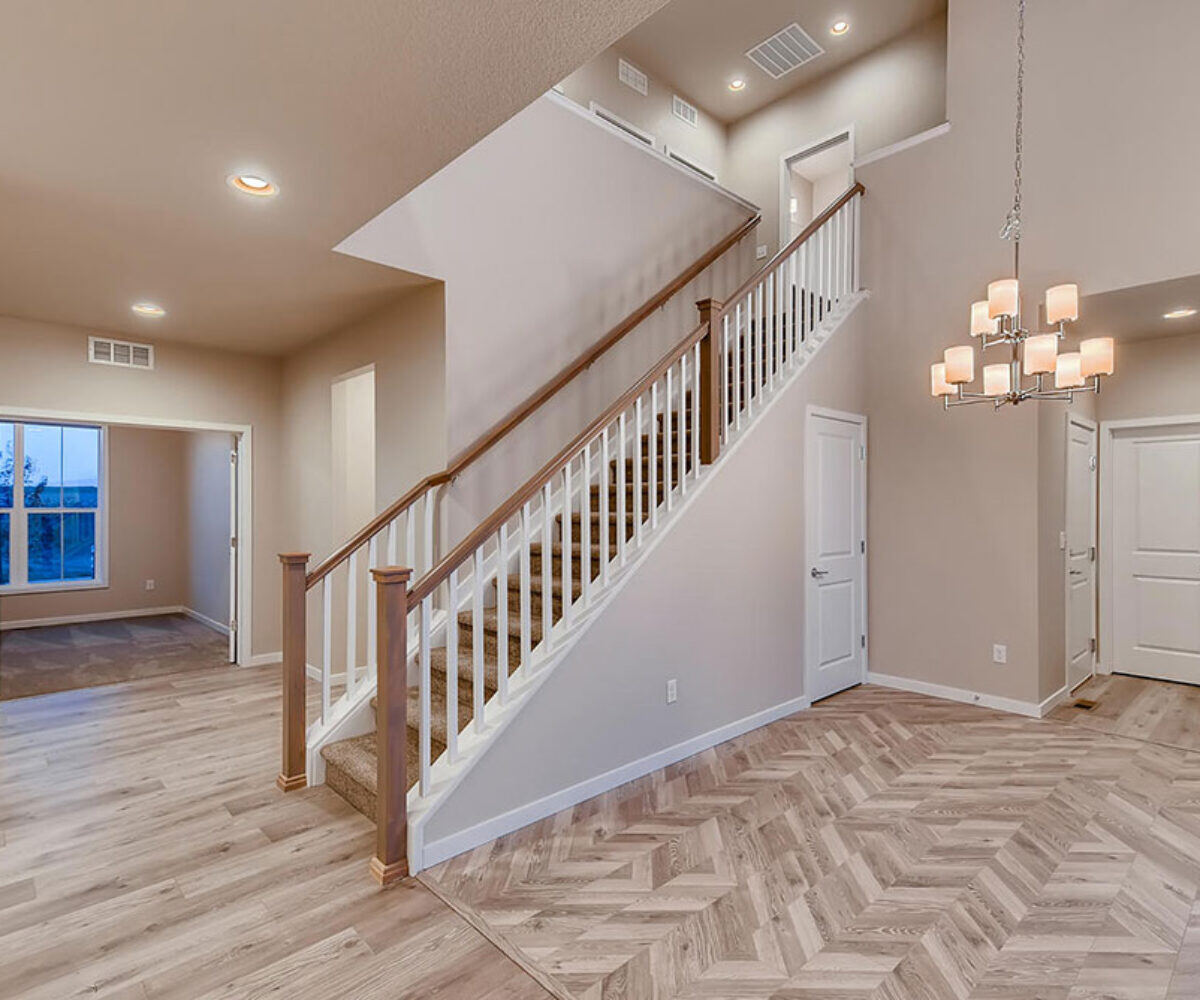5 Flooring Options for Your New Custom Home

Among the many decisions to be made when building a new home, the varieties and types of flooring will be one of the most important, and among the more expensive ones you will be called upon to make. The choice can seem daunting, not only because of the seemingly endless options available, but also because of the more permanent nature of the selection. Where you may find yourself replacing a sofa or some window coverings at some point, the thought of replacing hardwood flooring throughout your home doesn’t seem likely any time soon, so you’d better make a selection that is both durable and timely. No pressure, right?
Start by educating yourself on the available flooring options for your custom home:
Whether you choose to mix flooring styles, or stick with one throughout the entire house, it’s important to choose the flooring type that is best-suited for your your home, lifestyle, and budget.
1. Hardwood
Available in various species of wood from birch, hickory, cherry, and maple, to the more traditional oak.
- Pros:
Each species can be stained in a variety of colors to achieve a variety of looks. Planks are available in a variety of widths, and hardwood can be sanded and re-finished as needed in years to come. Hardwood lends a timeless, classic look of warmth and beauty, and has some give under-foot. - Cons:
Hardwood scratches easily. Care must be taken with furniture, pets, and high heels, as all can scratch, dent and/or pit the surface of the wood. Choose cleaning products carefully, as those with oil will affect the floor’s eventual ability to be refinished. Hardwood flooring is also among the most expensive type of flooring.
2. Laminate
Made from composite wood or melamine resin layers pressed together at high temperatures, with an image of wood or stone placed over the composite wood, covering it to form the laminate.
- Pros:
Much less expensive than hardwood, laminate flooring can mimic the look of hardwood for a fraction of the cost. It is also more durable and resistant to scratches than hardwood flooring. - Cons:
Laminate flooring has a different feel under foot and can be quite slippery when wet. The resonance when walking on it is much brighter and harsher than that of hardwood.
3. Tile
Made from porcelain or ceramic, available in a wide variety of sizes and installation configurations.
- Pros:
Tile flooring is extremely resilient when it comes to staining and wear. Spills wipe up quickly, and it is virtually impervious to everyday scratches. Upkeep is minimal. Many colors and patterns are available, including those that mimic wood grain. - Cons:
Depending upon where you live, or the season of the year, it may be a con that tile provides a cold surface unless accompanied by radiant-heat flooring. Additionally, tile flooring has no give under-foot and as such may be uncomfortable to stand on for long periods of time.
4. Carpet
Most often made from nylon, may be either a cut or a loop pile, or a combination of both.
- Pros:
As popular as hard-surface flooring has become, it may never replace carpet for bedrooms or other areas where warmth and softness are desired. Its comfort under foot and sound-dampening properties (especially on stairs and upper levels of the home) make it a popular choice not likely to go out of style. It is also available in a wide range of price points (and associated levels of quality). - Cons:
Stains are not as easily cleaned from carpet as from a hard-surface floor, and allergens and pet dander are more commonly associated with carpeting. This can be marginalized by frequent vacuuming and regular steam cleaning.
5. Vinyl
Most commonly referred to LVT (luxury vinyl tile) or EVP (enhanced vinyl plank) flooring, made of layers of PVC vinyl.
- Pros:
A newer player on the flooring market, EVP is extremely durable, waterproof, and resistant to damage, making it ideal for high-traffic areas and homes with kids and pets. It comes in many styles, many that mimic the look of wood and stone, and it has a warmer feel and sound under foot than does regular laminate flooring. - Cons:
Without proper care,vinyl flooring may start to look dull or flat over time. Regular sweeping and careful rinsing of detergent products will help to avoid this.
Which Flooring is Right for You?
Choosing the right flooring comes down to evaluating your needs as a homeowner and the amount of money in your flooring budget. Ask yourself the following questions:
- Who lives in my home? Ultimately, your decision of flooring type will be influenced greatly by your stage in life. Do you have small children at home? Do you own pets? Do you need to consider the needs of someone who uses a wheelchair or walker and may have a difficult time navigating on carpet?
- Will I live here long-term? You may be inclined to invest more in flooring if you plan to stay in your home for the foreseeable future. If, on the other hand, you plan to sell or rent you home in a few years, you may wish to choose more moderate selections.
- Will there be much foot traffic? You’ll be happiest if you select the most durable flooring for the highest traffic areas.
- What is the weather usually like? If you live in a snowy or rainy climate, a hard-surface flooring that’s easy to mop up will make your life easier in the long run. If you live in a cold climate, you may not relish having cold tile on your bathroom floor in the morning.
/Sheffield_Logo_Horizontal_Reversed.png)


